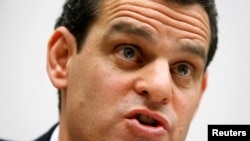Islamic State terrorists have made unparalleled efforts to finance their activities without relying on donations, and some U.S. lawmakers are wondering whether efforts to cut off the group's funding are falling short.
David Cohen, undersecretary for terrorism and financial intelligence at the U.S. Treasury Department, told lawmakers Thursday that oil sales that used to net IS $1 million a day have been slashed to a few million dollars a week — a significant difference when it comes to maintaining a fighting force of 30,000 or more.
“We have information that they pay their fighters about $1,000 a month," Cohen said. "That comes to $360 million a year in just the expenses for fighters.”
Cohen said IS also needs vast amounts of money to govern and provide services in territory it is trying to hold.
But lawmakers like New Mexico Republican Representative Steve Pearce question why more is not being done.
“You know which oil fields are under the control [of IS]," Pearce said. "I wonder why you are not stopping the oil today. ... Now, you can either blow up the tanks, you can blow up the trucks or you can blow up the connection between the two.”
'Shocked and surprised'
Democrat Maxine Waters of California, her party's ranking member on the House Financial Services Committee, said she also was worried that U.S. intelligence efforts were still lacking.
“Many of us were shocked and surprised that we appeared to know so little about ISIS (ISIL) when the information finally reached public view,” she said.
Cohen countered that "I do think we have good information. We need better information. But we are not, by any means, completely blind to how ISIL is raising its funds.”
Cohen cautioned that eating away at the Islamic State’s “substantial wealth” will take “time and patience.”
It will also take help from officials in Iraq and other countries in the region, like Qatar and Kuwait, where illicit money has been known to change hands.
Laws not enforced
Matthew Levitt, an analyst at the Washington Institute for Near East Policy, said that would not be as easy to obtain.
“Mostly, these are countries that have passed fantastic laws," Levitt said. "But when you get them privately and you ask them, 'This is a great law, 3.1 — have you ever implemented it?' 'No.' 'Have you ever used it?' 'No.' "
There are also concerns about the amount of money IS has generated through kidnappings and ransoms — at least $20 million this year — and the money Islamic State fighters have taken at gunpoint as they extend control over new territory.




